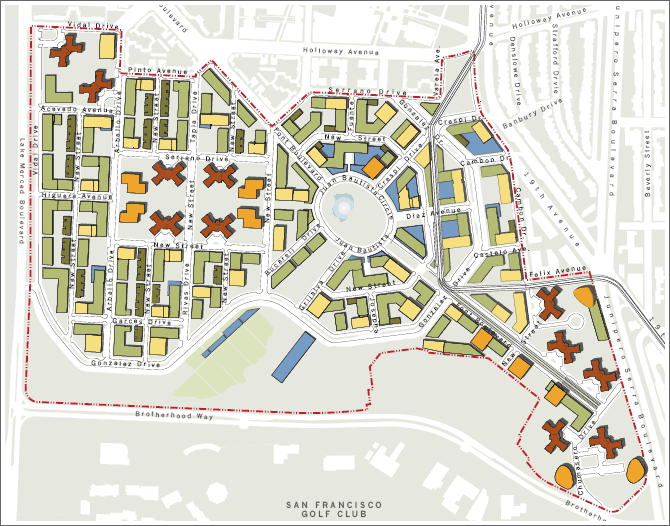By Tim Redmond
JUNE 13, 2014 — A legal case that’s pending in the state Court of Appeal could change the future of the giant ParkMerced development – and impact the way the city interprets the landmark controlled-growth initiative, Proposition M, which has guided city planning policy since 1986.
The case hasn’t received much media attention, but it raises an important question: How much authority do city officials have to ignore the plain language and intent of a ballot initiative by choosing to interpret it differently?
San Francisco Tomorrow, the urban environmental group that’s opposed to the ParkMerced project, argues that the mammoth development, which will add 5,679 new housing units to the southwestern corner of the city, is inconsistent with Prop. M, which protects “existing housing and neighborhood character” and mandates the preservation of historic buildings.
The Sierra Club joined the case by filing an amicus brief in support of SFT.
The ParkMerced project would involve the demolition of 1,538 rent-controlled apartments and would replace historic structures with new, more modern buildings.
It would also add 5,679 new units to the 152-acre site, putting immense new pressure on Muni service in the area with as many as 17,000 new residents moving into the area. The developer plans to build new Muni stops and offer shuttles, but the current developer fees for transit impacts don’t even come close to meeting Muni’s operational costs of serving new residents and businesses.
The Planning Commission and the Board of Supervisors approved the project, and the City Attorney’s Office is defending the case. The city argues that the planners and the supervisors found the project to be in compliance with the General Plan, and that their interpretation of that document should be given great deference.
Help us save local journalism!
Every tax-deductible donation helps us grow to cover the issues that mean the most to our community. Become a 48 Hills Hero and support the only daily progressive news source in the Bay Area.
The General Plan guides all city planning and development decisions, and includes the priority policies adopted by the voters in Prop. M.
Here’s where it gets interesting.
The cases that the city cites to defend its positions say, in essence, that if the legislators adopted the General Plan, then those legislators knew what they intended, and they pretty much have to right to interpret that document any way they want, within reason.
But Stuart Flashman, the lawyer representing SFT, argues that the Planning Commission and the Board of Supervisors never adopted the Prop. M policies; they were approved by the voters, over the opposition of most of the elected officials in the city at the time.
The politics of San Francisco in 1986 play a key role in this case. At the time, most of City Hall was in hock to the big developers. Supervisors were elected at-large, requiring huge amounts of campaign money. The mayor, Dianne Feinstein, appointed every member of the Planning Commission, and she strongly supported increased highrise office development.
She also opposed all efforts to force developers to pay their fair share of the costs of Muni and affordable housing.
Feinstein, her planning commission, and the city attorney, Louise Renne, were all against Prop. M and fought to defeat it. In fact, Renne pulled a move that almost kept the measure off the ballot.
After proponents had gathered all of the necessary signatures (and plenty more) and turned them into the Registrar of Voters, Renne ruled that the petitions were invalid because they had been prepared under county law, not city law.
San Francisco is, of course, both a city and county, and at the time operated with a county registrar of voters, not a city Department of Elections. That has since changed.
But with the deadline for the November, 1986 ballot looming, the activists found four supervisors (the only four who ever supported progressive issues) to place the measure on the ballot.
It was a bitter campaign, with Feinstein and much of the local political establishment raising money and denouncing the measure as fatal to the local economy.
Yet the voters approved Prop. M, overruled the existing planning and policy bodies, and made a clear statement that they wanted the direction of local development changed.
The rules in Prop. M were very clear; the authors had seen too much pro-development interpretation of vague laws, so they included eight priority policies that are very specific. The measure states that the city can’t approved any development inconsistent with those policies.
“A project is inconsistent if it conflicts with a general plan that is fundamental, mandatory, and clear,” the appeal brief states.
Prop. M says that the city has to protect existing rental housing. The ParkMerced plan calls for tearing more than 1,000 units down. The developer has promised to replace them with housing that will be rent-controlled, but state law says that all new housing is exempt from rent control.
So the question before the three-judge panel at the Appeals Court is clear: Can city officials “interpret” the development agreement as consistent with Prop. M when the plain language of the initiative is violated?
Or, as Justice Anthony Kline asked during oral argument on the case May 19, what happens if two of the priority policies are inconsistent (say, historic preservation and affordable housing)?
And, as landscape architect Glen Rodgers, who was at the hearing, wrote in a summary he sent to me, would a decision in favor of the city impact Prop. B, the waterfront height limit measure, if city officials decided to “interpret” it in a way counter to what the voters intended?
Kline, according to most account, was dubious about Flashman’s argument, saying that “chaos” could result if every aspect of Prop. M had to be followed to the letter.
The decision should come down this summer.




